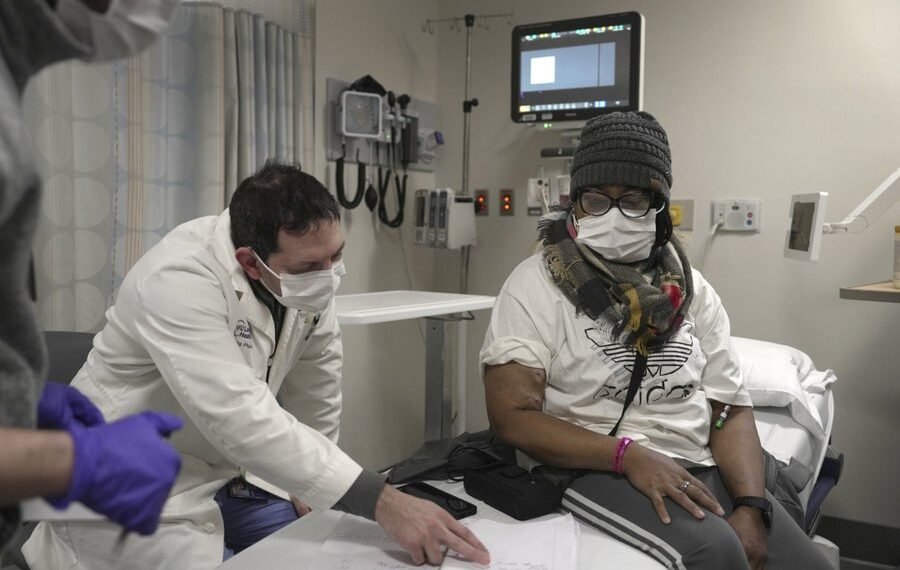Despite initial concerns about rejection, Looney’s pig kidney is functioning normally, showcasing the potential of xenotransplantation. With ongoing research, scientists believe animal-to-human transplants could soon become a viable solution.
BY PC Bureau
In a groundbreaking medical achievement, Towana Looney, a 53-year-old woman from Alabama, has set a record as the longest-surviving recipient of a pig organ transplant. Having lived with her genetically modified pig kidney for over 61 days, Looney remains in excellent health, full of energy, and eager to share her experience.
“I feel like Superwoman,” Looney told The Associated Press, joking about how she now outpaces her family members on long walks around New York City. “It’s a new take on life.”
Looney’s remarkable recovery has provided a significant morale boost in the ongoing pursuit of making animal-to-human organ transplants a viable solution. Prior to her, only four other Americans had received experimental pig organ transplants—two hearts and two kidneys—but none survived beyond two months.
Dr. Robert Montgomery of NYU Langone Health, who led the transplant, described Looney’s kidney function as “absolutely normal.” He remains optimistic about her long-term health and expects she will be able to return home to Gadsden, Alabama, within a month. “We’re quite hopeful that this kidney will continue functioning well for a significant period of time,” Montgomery said.
Towana Looney of the US on Saturday became the longest-living recipient of a pig organ transplant, surviving with her new kidney for 61 days and counting. "I'm superwoman…It's a new take on life," 53-year-old Towana said. Only four other Americans received transplants of… pic.twitter.com/rJyyBowkkE
— Nut Boult (@NutBoult) January 26, 2025
A Step Toward Solving the Organ Shortage Crisis
The success of Looney’s transplant underscores the potential of xenotransplantation—the process of transplanting animal organs into humans—as a solution to the critical shortage of human organs. Currently, more than 100,000 people in the U.S. are on the transplant waiting list, with the majority needing kidneys. Thousands die each year while waiting.
To address this crisis, scientists are genetically modifying pigs to make their organs more compatible with the human body. So far, these transplants have been allowed under the FDA’s “compassionate use” program, which permits experimental treatments for patients with no other options.
United Therapeutics, the company that provided Looney’s kidney, has now requested FDA approval to initiate formal clinical trials in xenotransplantation. If granted, these trials could bring the medical field one step closer to mainstreaming pig organ transplants as a standard treatment option.
A Second Chance at Life
Looney’s path to this historic transplant was anything but ordinary. In 1999, she donated one of her kidneys to her mother. However, complications from pregnancy later led to high blood pressure that severely damaged her remaining kidney. After spending eight years on dialysis, doctors concluded that her body had developed an unusually high level of antibodies, making it nearly impossible to match her with a human kidney donor.
With no other viable options, Looney chose to participate in the experimental pig kidney transplant program. Her case was especially intriguing to researchers because of her heightened immune response, which could have increased the risk of organ rejection.
A New Frontier in Transplant Medicine
Following the surgery on November 25, 2024, Looney made a swift recovery and was discharged just 11 days later. However, doctors remained vigilant in monitoring her condition. About three weeks post-transplant, early signs of organ rejection appeared—an issue researchers had anticipated thanks to a prior 2023 study, where a pig kidney functioned for 61 days in a deceased donor. Fortunately, Looney’s doctors acted swiftly and successfully halted the rejection, ensuring the continued functionality of her new kidney.
Beyond her personal health journey, Looney is now using her experience to help others. As an informal ambassador for xenotransplantation, she has received messages from patients desperate for organ transplants, many of whom are considering similar procedures.
One individual, fearful about undergoing a pig kidney transplant, reached out to Looney for advice. Rather than pushing him in one direction, she encouraged him to rely on his faith and follow his heart. “I didn’t want to persuade him one way or the other,” she said. “I just told him to pray on it and listen to his faith.”
What Lies Ahead?
While Looney’s case represents a significant breakthrough, doctors remain uncertain about the long-term viability of pig organ transplants. If her kidney were to fail, she could return to dialysis. However, the unprecedented success of her case provides valuable data for future transplants.
Dr. Montgomery acknowledged that the medical community is entering uncharted territory. “The truth is, we don’t know what the next hurdles will be because this is the first time we’ve gotten this far,” he said. “We’ll need to closely monitor her condition and learn as we go.”
For now, Looney remains optimistic and grateful for her second chance at life. “I love talking to people, I love helping people,” she said. “I want to be part of this movement that changes lives.”
As researchers continue to refine xenotransplantation techniques, Looney’s case offers a beacon of hope for thousands of patients awaiting life-saving transplants. If scientists can build on this success, the future of organ transplantation may look very different—and far more promising—than ever before.














